Theatre Reviews
THE RISE OF REPTILIAN FLUX AND OTHER STORIES - Shoreline of Infinity’s The Infinitesimals Present

Shoreline of Inifinity is a Scottish Sci Fi Magazine that also runs events and performances, and under this banner they presented a new live performance, The Rise of Reptilian Flux, and two recorded performances.
Host Noel Chidwick, who introduced us to Shoreline of Infinity, was soon interrupted by a broadcast, apparently from an alternative universe, on Z.O.M., a steam-powered visualisation representation device.
This is a steampunk Britain where Queen Victoria is still on the throne, and adventurer Lord Fortescue has been pillaging Egyptian temples for treasure. His cheerleader, Dr Thomas Pettigrew, is preparing to unwrap a reptilian cadaver, against the advice of Dr Margaret Benson, who cautions about the disasters associated with previous unwrappings, including a mysterious plague that is spreading across the world.
It’s an inventive and funny satire from Fringe favourite Debbie Cannon, Jonathan Whiteside and Ben Blow that unfolds in three episodes across the evening. There’s a jingoistic news bulletin, which is clearly not telling the truth, though I like the idea of Her Majesty’s four o’clock giggle at the mess the old colony of America is in! It culminates in a lockdown video diary as Reptilian Flux spreads...
In between there are two intriguing short pieces, Republic of David is a podcast that has been augmented with an animation investigating the perils of instant emigration and the impact of a gremlin in the machine, and Approaching 43,000 Candles has been recorded at a sci-fi conference.
The recording will remain available until the end of July, well worth catching up with the Rise of Reptilian Flux!
Stephen Walker
SPECIAL MEASURES - CAST READ THROUGH - Blackboard Theatre
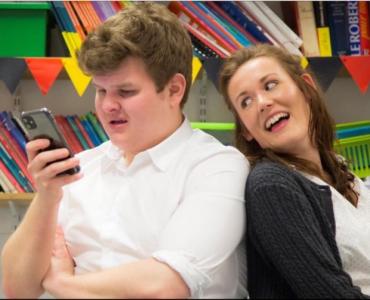
Teachers – people we remember, praise and thank, or people we make fun of, tease, anger. It all depends on who we are… grateful parent, disaffected and uninterested child. Either way we all depend on them.
This play(reading) is about the life in a school discovered by a young newly-qualified teacher. It is a school which plainly would not stand high (putting it mildly) in any OFSTED review.
We have two actors taking on a myriad variety of roles: from OTT Head through disaffected staff at all levels, and countless slow-learning kids who don’t want to be there.
Molly Atkinson is (most of the time) the new teacher and we hear from her, finally trained and turned into an adult with responsibilities, and share the stress of arriving for the first day in the disorganised school, of introductions, of the first drama lesson with a bunch of 'don’t-want-to-be-there' Year 9 students. She’s the playwright as well as being a primary teacher. Just about all the other characters – male, female, young, old - are played by Dean Osgood (in real life a secondary school teacher). It’s plain for us to see that he’s seen them all and maybe chuckled privately at the way they are. He caricatures them mercilessly.
This was an on-stage rehearsed reading. It was recorded for subsequent viewing, apparently on Zoom, and that is the version I saw. There were three distinct screens (one for the stage manager reading the stage directions) and two for the actors. They talk as it were to each other, but there is little interaction for us to see, and it feels more like a series of monologues. I feel that some of the detail of the read stage-directions was un-necessary and we could have been encouraged to use our imaginations more.
Most of the piece is in character(s), but the telling points are where Mollie comes out of character and talks direct to us. This is where the meat is: who’d be a teacher, why be a teacher in the less-effective schools, what rewards are there when on the one hand, parents 'don’t see the progress their children are making' and on the other hand the senior staff are trying to get the worst students off the lists before OFSTED comes to visit.
It could be a depressing narrative but it isn’t: the caricatures are entertainingly silly (and could be in just about any workplace), but it closes with an uptick – every student matters (even though we heard earlier that some matter more than others. It’s rewarding, too, that this Buxton Fringe Vimeo cast has spawned an online series of conversations, debates, experience-sharing.
Michael Quine
THE CROOKED SPIRE - MEDIEVAL MURDER-MYSTERY MUSICAL - Ashgate Heritage Arts
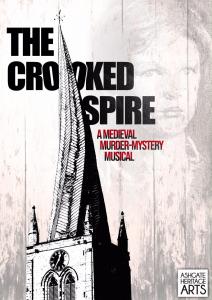
I wasn't sure what to expect when I signed on at 7pm to watch the developmental performance of The Crooked Spire, a medieval murder mystery set in the building site that was to become Chesterfield's famous parish church. What I got was a tantalising teaser of musical written by previous Fringe winner Mary Hennessy with Martin Coslett and Peter Gray (music and lyrics) and based on a novel by Chris Nickson.
We meet John (Sam McCagherty) as he gets a job working on the spire. Will, the Master Carpenter (Niall Gray), is murdered, and John, who has come from York with a clouded past, is put in the frame. But things are set to become more complicated. What did the child Walter (very ably played by Henry Chalk) see that has upset him so much? And is it all to do with the wood being used to build the spire?
The actors and singers have worked in their own homes, and all have been neatly edited together, with some rather neat bits of interaction where things seem to be being passed between screens. The singing is stunning, and the narration, by John's landlady Martha (wonderfully voived by Helen Grady) holds the piece together.
I found the shots as we trailed someone through modern Chesterfield a little confusing, but the songs and scenes show that this is an interesting story in the making, and left me definitely wanting to know what happened.
It felt like a privilege to be given a glimpse behind the scenes of a piece in development. Go to www.ashgateheritagearts.co.uk for a link to the performance. There is a discussion at 8pm on 18 July, hosted by the writers Martin, Peter and Mary, on the trials, tribulations and fun of working collaboratively on-line to create the musical and bring it to the virtual stage.
Suzanne Elvidge
DIARY OF A MADMAN - Damn Cheek Productions
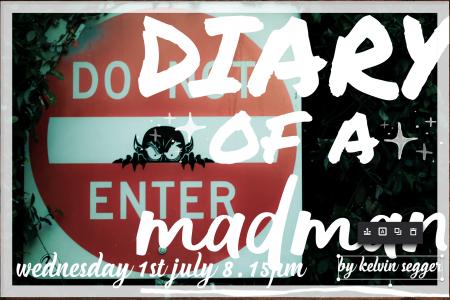
Darren Cheek has worked up a reading/performance of Gogol's fascinating tale of one man's descent into madness, in a version of the original made by Kelvin Seggers. The story, the sequence of events, is shown to us with clarity: we have the sequence of characters observed by the writer/diarist - from the overbearing untrusting immediate boss to the Director, one layer up, whose daughter he admires and loves (while she detests him). The script and the performance are set in St Petersburg and this viewer's imagination was set alight by references made in the script.
The performance was far from the all-too-frequent static Zoom: on several occasions the camera followed the actor moving. Sometimes this was done in a way which seemed violent and which maladjusted the focus but which may have been intended to reflect the clash of feelings in the character: however, one of the moves was completely delightful and totally successful - as the character visits, ever so respectfully, the home of the Director, so the view pans round admiringly to packed bookshelves across the room: this seemed a fine reference to the way that politicians and others in these days of lockdown seek (or don't seek) to get the right domestic background for their Zoom interviews.
Plainly Cheek brings his own knowledge of the field to Gogol's analysis - obsession, hallucination, misplaced trust, disbelief, delusion, in the descent into insanity ... all these have their place in a show which is faithful to the original yet allows it so speak to, and for, us at the current time. The text itself may be set at a particular time and place, but the content is universal.
This was billed as a reading: that is to understate the performance and delivery, which showed every sign of thorough familiarity and understanding. Fact is, it turned out, that he WAS working from a script which he alone could see. We wouldn't have known save that he admitted it in the post-show discussion, and that explains the constant screen reflection in the actor’s spectacles. I believe that the show is to have a future life with and amongst live audiences: that will allow him to pace the performance to suit the people present, and to do more to bring out the humour.
Michael Quine
THIS MORTAL COIL - Aulos Productions
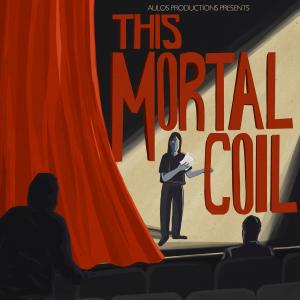
Buxton Fringe regulars Aulos Productions have risen to the challenge of lockdown with a new radio drama that is running over the course of six weekly episodes until 14 August. This Mortal Coil finds a theatre company faced with disaster when director Paul is stabbed to death.
James Beagon's play is an entertaining whodunit filled with larger-than-life characters: the squabbling actors, the put-upon costume and tech people, the pretentious critic. Even the detective is a would-be actor with a history connecting him to rest of the cast.
This Mortal Call has the feel of a light-hearted detective story in the style of one of those daytime dramas like Father Brown or Shakespeare & Hathaway. It's a fun, diverting listen with some nice lines ('A few iambs short of a pentameter'), which make it worth returning to for future episodes.
Robbie Carnegie
SUDDEN IMPULSE VIRTUAL BUXTON 2020 - Sudden Impulse Theatre Company

Nuneaton-based Sudden Impulse have become such an established part of the Fringe that it’s no surprise to learn that they would have been bringing their 14th show to Buxton. Alas, it wasn’t to be, but instead they have put together five videos describing what they do during the rest of the year when they are not in Buxton. Something else that isn’t a surprise is that it is mightily impressive!
The first episode focuses on Shakespeare, and future episodes over the coming nights will cover Pantomimes, Musicals and more, but to begin with we get to meet many familiar faces talking about what coming to Buxton means to them. And it seems they love Buxton as much as we love them. It is good to hear that all the things we think are good about Buxton are what they enjoy too: the challenge of performing away from home turf, seeing lots of other performances, the friendly audiences, and of course, socialising outside the Old Clubhouse!
Then it’s on to Shakespeare. Every June, Sudden Impulse tour fabulous outdoor venues usually with one of the bard’s comedies, though this year it was Romeo and Juliet that was cancelled. The backdrops of old ruins are spectacular but the company's costumes are gorgeous, and if the snippets of Shakespeare we get are anything to go by, the shows must be great to watch. It’s good to see a Fringe favourite, Phil Malkin, as Benedict and Nathan Harvey is fun as Dogberry in speeches from Much Ado About Nothing. The Shakespeare tour ends just ten days before they come to Buxton - it feels like there is room for an overlap, live Shakespeare in Pavilion Gardens anyone?
As Simon Winterman introduces the episode and talks about the company and the work, it is lovely to see the posters from all their previous productions, and to be reminded of what a high standard of work they always bring. It will be great to see them back in Buxton next year, so go and see their shows and between times, you’ll probably find them outside the Old Clubhouse having a pint in the sunshine.
Stephen Walker
SOUNDS LIKE THE NHS - Magdalen Theatre

This is a Fringe comeback for Sounds like the NHS which won the award for New Writing at the Fringe as far back as 2002, although Mary Hennessey has reworked it into a radio play and has updated it to incorporate references to the current Coronavirus pandemic. It is a look at life inside the NHS from the perspective of a woman who is immobile in hospital following a serious car accident.
From the moment of her crash, through the dips in and out of consciousness, and during her long road to recovery, Mary recounts her interactions with the NHS, the other patients and her family. The play also sees a welcome return to the Fringe for Helen Grady, who is excellent as Mary, thoughtful as she works out what is going on around her, and with a wry sense of humour about her predicament though it’s her panic at the worst case scenario that really brings home her precarious situation to us.
The detail in the play, such as Mary’s ability to tell which nurse or family member is on their way from their footsteps, makes it real and there is huge sympathy and gratitude for the staff of the NHS, though it’s not entirely uncritical - there’s the nurse who asks her to raise her head so she can move a sheet, and the less said about the tea and meals the better!
The play is not so strong when Mary takes a polemical view of the management of the NHS governments over the past forty years; it feels a little forced and the point is better made when focussing on the minutiae of hospital life and the real life travails of the staff and patients. The sound effects by Alex Butler are excellent and this production would fit very well on afternoon Radio 4.
Sounds like the NHS makes a triumphant return to the Fringe, and reminds us that for all the eulogising of the NHS over the past four months, it is an institution desperately in need of care itself.
Stephen Walker
ONCE UPON A TIME IN TRIESTE - Silver Pine Productions
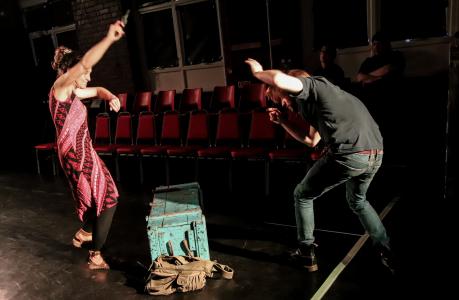
Our 2020 online Fringe has offered the opportunity to hear a radio style production of 'Once upon a time in Trieste' which was produced on stage for the 2019 Fringe. That production was nominated in several categories for Buxton Fringe 2019 awards and won in the New Writing category. The play works well in audio only and the acting and direction is of a high standard. One could imagine it broadcast on the BBC. The play is split into five parts and made available on Soundcloud.
The premise of the play brings together two historical characters from different periods who could never have met in real life but who both experienced dramatic personal events in the city of Trieste. One is a revolutionary 'Pinko' who made an unsuccessful assasinaton attempt on Mussolini in 1938 and the other a Belgian Princess 'Charlotte' who received life changing tragic news while staying in the city in the 1860s.
The tension in the play arises in part from the inevitable differences in world view. The geopolitics of the city as well as the wider world are very different for the two characters and this drives the dialogue as the two of them argue. Pinko has the advantage of knowing the fate of Charlotte and her family while Charlotte has the certainty and confidence that comes with her aristocracy.
The play is necessarily absurd with overtones of Beckett and Stoppard but, like those writers, the dialogue is riveting as the characters squabble, play games to pass the time and consider aloud whether the other is a figment of their imagination. Anna Girolai's writing is very strong but much of the power of this production is due to the direction of Simon Corble and the acting of Sarah Gordon and Carl Bownas. Carl also wrote the music which is also rather good.
This play may not be everybody's cup of tea because of its absurdist fantastical nature. However I loved the production. For me the characters were very real. I enjoyed how the relationship developed between the two and how the writing presented history in a very original way.
Alex Watts
THREE VOICES - Debbie Cannon

Three women, nothing in common apart from the fact, that is, that they are all in Lockdown. Lockdown has affected all of us in different ways. In this production we meet Anthea, Esther and Paula and, as we listen to their voices, it becomes apparent that Lockdown has impacted greatly on all of them.
Debbie Cannon is a very talented writer and actor. Some of you may have seen her production Green Knight, which she has brought to the Fringe for the last two years. Green Knight focussed on the voice of one strong woman. This year Debbie has brought three very different women to Buxton. You can listen to all three stories at once or you can dip into the tales at separate times.
Anthea, Esther and Paula look different, they sound different, they have different patterns of language, but each woman is totally engaging. From the first sentence spoken by each character I wanted to hear their stories; I cared about them. In each short video the layers of the stories are carefully exposed and emotions slowly revealed. At times you will be laughing out loud, at other times you may feel sadness empathising with what one of the women is feeling and at other times you might feel concern and hope that everything will turn our fine.
Debbie has created real women. OK we have not all responded to Lockdown the way her three characters have, but each one is a woman you can imagine meeting for a coffee and a chat. You can feel Anthea’s nervousness at using Zoom and sense the unresolved issues she has had time to dwell upon during Lockdown. You know that Esther, the bright ad bouncy children’s entertainer is quite unlike the real Esther, who has a sad story to tell, and you can picture all Paula’s office colleagues and the life she has led, working loyally for the same firm the whole of her career. As well as being entertaining, this work has led me to think about ways in which Lockdown may have changed how I respond to things.
So, I highly recommend clicking onto the link to meet Anthea, Esther and Paula for yourselves. Thank you Debbie for creating this very special, new and relevant work to bring to Buxton Fringe.
Viv Marriott
THE AFFINITY INITIATIVE - But Why?
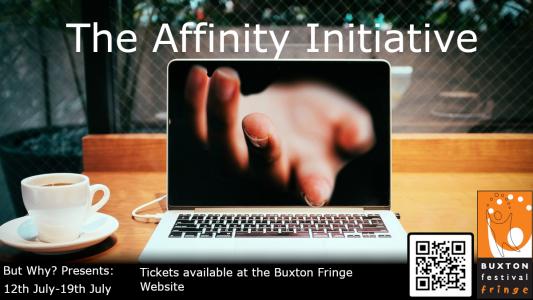
Can we still find 'that spark' digitally? The D8R collective brings their revolutionary socialisation system to the Buxton Fringe and is looking for beta testers. I volunteered, and was matched with Aimee for a zoom call, the link to which was sent just before the performance began.
Aimee was a pleasant if slightly insistent young woman who asked me lots of probing questions, and drew me into conversation about all kinds of issues, exploring my interests and attitudes. I found it flattering to have a chat with an attentive stranger, and was thoroughly enjoying expounding on life, the universe and everything until the call ended. I can’t say too much more about the performance, but suffice to say that there is much more to what is going on than just this call, so watch out for your emails.
You have to be alert and I suspect you must be prepared to commit to the performance to get the most out of it. I decided to go for it, and at times was genuinely thrilled by what was happening. Do check your email inbox - from making your booking up to the actual performance you may find some slightly odd messages appearing in your inbox, and especially during the performance itself. Be prepared to access links and interact on your computer. It is not difficult, and though it may feel a little uncomfortable, just go for it! It’s worth it.
Featuring one-to-one immersive performance and real-time interaction, But Why? has brought something very intriguing and thought-provoking to its Buxton Fringe debut.
Stephen Walker
THE LANDSCAPE JUKEBOX - Bloom
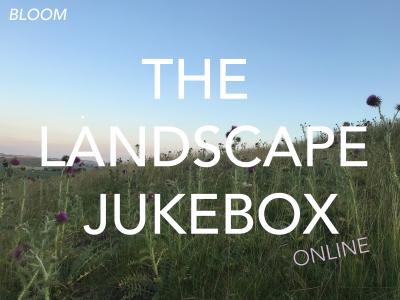
The Landscape Jukebox is a thoughtful, intriguing series of short films, capturing the beauty of Buxton and the High Peak, but also forcing us to consider philosophical questions about time and conscious thought.
In the first six films (there will be a further twelve introduced over the course of the Fringe) we are introduced to three voices, two female, one male, who travel through the landscape. We hear plans to meet up, and then experience the awkwardness of reunion after enforced separation. We consider geological time, and how infinitesimally small human time is in comparison. We contemplate thought and language - do we think in sentences? In what language? Could we just switch our thoughts off?
The visuals are relaxing and occasionally surprising - in one of the videos, a view of Solomon's Temple is animated by drawings of the two friends meeting up.
This is an intriguing, mindful piece of work, created with imagination and artistry, and well worth watching. Each piece is short, so the viewer is left with a collage of thoughts and images that force us to think about the landscape around us, and our place within it.
There will be further videos posted on July 15th and 18th.
Robbie Carnegie
THROUGH THE SCREEN - Orange and Pip Theatre
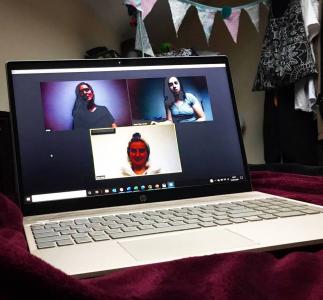
Lockdown has been a challenge for all of us, in many different ways. Through the Screen from Orange and Pip Theatre looks at the impact on a group of three friends and flatmates at university, all quarantining separately in lockdown. This bright, clever and bittersweet drama introduces us to sweet Rosie, the clever and kind one and the glue that holds the group, pretty Jess, who is besotted with her boyfriend and loves new clothes, and brittle Paige, who is spiky and impulsive and above all wants to be someone she's not.
Paige has something to hide, and when Rosie finds out her secret, it has the potential to tear the group apart. The whole thing is played out on Zoom, with the awkward silences and muted mics that has become so familiar to many of us. Through the Screen highlights the intensity of friendships at university, the obliviousness of love in your twenties, and the power that people can hold over others when there is a secret and a friendship at stake.
Through the Screen reunites Orange and Pip Theatre in a lockdown project after their sell-out successes After Alice (2014) and Ugly (2015). Cracking writing and acting – well worth 55 minutes of your time.
See Through The Screen at https://bit.ly/OrangeandPip 9-19 July 2020.
Suzanne Elvidge
THE GRANDMOTHERS GRIMM - Some Kind of Theatre

The action of this play takes place one evening at the house of the brothers Grimm, Jacob and Wilhelm. They have been out collecting folk tales from the old women who scrape a living by telling these stories in hostelries. The brothers believe that by collecting and publishing the stories they will help unify Germany and preserve the German culture from the ever present threat of French domination. For Wilhem there is the added incentive of the book making enough money to enable him to set up his own home and marry. They are joined by Maria Hassenpflug, an author who did in fact supply the brothers with many of the now favourite stories, and old Maria, the housekeeper who is there to represent the many women the brothers took stories from without ever giving any credit to their sources.
Over one evening Jacob and Wilhem helped by both old and young Maria read and act out the stories that have been collected. During the course of the retelling both Marias add remembered details, suggestions are exchanged and stories subsequently adapted. There are tantalising glimpses of the familiar fragments many of us remember from childhood. Princesses kissing frogs, pigs and even donkeys; spells being cast and several versions of Red Riding Hood. The origin of this story is explained as coming from a time when dangerous wolves roamed the forests and poor people had to resort to cannibalism in the winter if family members died and food was scarce.
Relationships between the characters are developed well. Wilhelm wants the stories to be gentle and appealing to a young audience whilst Jacob wants to keep more closely to the original, rather gruesome stories with all their violence and bizarre storylines. As for Maria Hassenpflug, she becomes more and more angry at how women are portrayed and urges the brothers to make the women less passive.
These snippets of fairy tales, explored and acted with gusto by the highly talented cast are highly entertaining. Woven into these snippets we recognise repeated themes and familiar narratives in unfamiliar stories. Jacob is particularly adept at grabbing an idea from one story to use in another tale.
Enjoyable, well researched, performed by a talented cast who clearly enjoyed what they were doing this play is a fitting tribute to the Grandmothers who supplied the Grimm brothers with the raw materials for their tales.
Viv Marriott
THE LION AND ALBERT (AND FRIENDS) - Hancock Fabrications
This is a calm and cheerful performance/recitation of 6 or 7 of the poems of Marriott Edgar. Who? Marriott Edgar was a performer, writer and poet in the first half of the (last) century, and he wrote around 30 monologues in rhyming verse which became familiar and popular in performances by Stanley Holloway. Hence the title of this event.
We all know the tale of Albert being eaten by the Lion ('There's a famous seaside place called Blackpool, that's noted for fresh air and fun' and Albert with 'his stick with an ‘orse’s ‘ead ‘andle, the finest that Woolworth’s could sell'. And we all know so many of the expressions used in these monologues - 'Tuppence per Person per Trip', in 'The Runcorn Ferry', and so many more
The performance is not just of Edgar's work - we also have Robert Service's 'The Ballad of Sam McGee', another of those pieces we know but not quite well enough, but most is Edgar.
There's no attempt to replicate Stanley Holloway - for a start, he mostly had a piano accompaniment which helped along the steady rhythm of the verses - and this first performance was Lewis Hancock just standing under a slightly dripping tree.
But it works: it's not at all a challenging 40 minutes, it doesn't set out to be, and all the better for that. An amiable performance, obviously with enjoyment in retelling these delightful tales with the right accents, and often enough, along the way, challenging us to remember and delight in the lines and the rhymes that are so much a part of that era of the concert party and then the music hall. Still satisfying and enjoyable these days - it was good to hear them again.
Michael Quine
IT'S ABOUT TIME - The Institute of Managing Performance
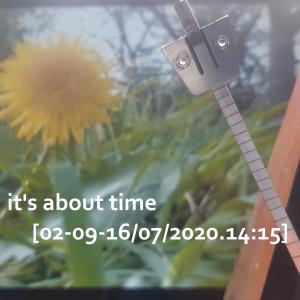
Although in our modern lifestyles time is remorselessly delineated by our clocks, watches and digital devices, in truth time is relative. As we are all on the same planet, we don’t notice the effect of this, so it’s odder still that the way we experience time is often relative to what we are doing. In response to one of Mark Reid’s comments about time (available on his blog page – see the link), somebody noted the way lockdown has affected their perception of the time of day, and how they often realise it is two hours later than they think it is. Mark Reid’s livestream about time reminds us of the many words and expressions we use to talk about time and his book-lined study contains a number of different objects which we use to measure time. Although time is ever present in our daily lives, it is probably rare that we spend much time thinking about it, and Mark Reid’s performance allows us space to do so and the opportunity to contribute our thoughts to be incorporated into his next live performance.
Georgina Blair
THE GAMBIT - Rampant
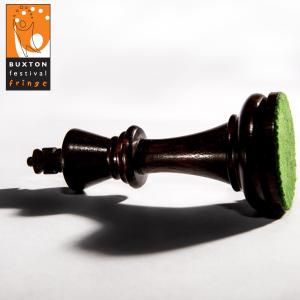
The title of this show, 'The Gambit', ought to have given it away but to this reviewer it didn’t. It’s rooted in the game of chess. Even the characters’ names, heard only, didn’t give the clue – Gary, Anatoly. It took me too long to realize that these are Garry Kasparov and Anatoly Karpov, and that the Petrov referred to is Marian Petrov, the Bulgarian champion chess player and coach.
But it’s not about chess: it’s about two people who’ve not met for some 25 years, coming together over a chess board and talking about the past. Can they rebuild a relationship? In amongst the slap of chess pieces re-locating on to the board, the two men, one time friends and professional rivals, and both with concerns about the politics in their respective eastern-bloc countries, reflect on their memories: what separated them, what forced them to drift apart, why it’s been so long since they met each other – and, towards the end, whether it was a good idea anyway. Given their geo-political backgrounds, there’s a fascinating reference to the rule(s) of law: politically, things change so that you never know where you are, whereas it’s the unchanging rules of chess which give us freedom.
This play works wonderfully in sound only, even better, perhaps, than it may have done on stage, judging by previous reviews. There's nothing to distract from the sharp, reflective dialogue, beautifully delivered and paced so as to leave us constantly thinking, analysing, understanding, wondering. I’ve now chosen to listen two times in order to keep up with the complex interplay of ideas.
Two chess masters discuss a failed relationship: jealousy, bitterness, recrimination, guilt, belief (or otherwise) in fate, fondness; a life of freedom yet one which, like chess, is bound by the rules, uncertainty. Chess is the game - the game of life.
Apparently this play was seen in Buxton in 2013: it is very good to hear it now. And it’s lost nothing over time. Written by Mark Reid, with a sensitive approach to feelings and to sensitivity as the characters open up, hesitate, quibble: Ben Rigby as Anatoly and Nick Pearse as Garry bring to the script a sensitivity and a mixture of hope for the future with a sadness that what’s gone cannot be recovered . 45 minutes of fascinating and challenging dialogue. Recommended.
Michael Quine
STICKS & STONES - Breadface Theatre Company

Breadface Theatre had originally planned a full-length piece, The Petite, Average, Plus-Sized Show on the subject of body image, stereotypes and power to tour Fringes this summer. But Covid-19 got in the way.
Instead, we have an eye-catching taster of what was to come in the form of Sticks and Stones, a pop video style film dealing with the sort of verbal abuse that is routinely dished out to young women. From 'stick insect' to 'wildebeest' to 'knob-nose', the three actors - Chloe, Elise and Katie - clearly write and perform from experience in detailing the words used against them as they have gone through life.
The video is slickly directed and edited, capturing the tropes of MTV, and the three actors play a range of different characters between them. Ultimately, however, as the layers of make-up and sassy vogueing are removed, we see them as themselves - each with their own beauty, each vulnerable to the labels that their peers throw at them.
This video promises much and leaves you in no doubt that a full show will be equally entertaining and thought-provoking.
Robbie Carnegie
CROSSING THE LINE - THE FULL STORY - Joanna Lavelle

Three years ago, Joanna Lavelle gave us a fascinating and successful double bill. The first piece was 'Crossing the Line', told by the wife of a man who has for years, but without her knowledge, been consuming child sexual abuse material. It was warm, open, honest and beautifully performed: a delight to watch and to inhabit.
This year we have 'Crossing the Line – the Full Story'. Four separate, linked, short monologues look at the issues and consequences from from four different points of view – the wife (this is the piece from three years ago); the police officer on the edge of retirement, ground down and mentally exhausted by years of investigations; the mother of a youngster; and finally the man himself, described by the wife who then reads his final letter to her.
If that sounds as if it’s a piece of bluntly socially-focussed theatre, then accept that it is, but that it is just as much four pieces of beautifully performed, paced emotional theatre – it stands up wonderfully in pure performance terms. Watching, we find the performer reflecting, remembering, asking herself why – how - she didn’t know: trying all the time to understand and appreciate the others’ point of view. It’s convincingly, persuasively, compellingly and honestly delivered. We recognize each of the characters, we 'know' them, we appreciate the way that they work towards coming to terms, perhaps especially the mother at the end of the third.
Seeing it as piece of engaging theatre performance, time just flies. Of course the underlying theme is a disturbing one: you can’t watch these monologues and ignore that, but just to watch, listen, share the performance is a joy in itself.
When I saw the first of these, three years ago, it was the performance/presentation that grabbed me: I didn’t know much in advance. This year, of course, all four are online, one after the other, though we can pick and choose: but what’s also new is a short introduction from Lavelle which makes it explicitly clear what the underlying theme is, and pointing us in advance to at least one charity which is there to help. More, Lavelle makes the offer to go and perform any or all of these plays for appropriate audiences. Michael Sheath, the plays’ writer, works for that Foundation and plainly draws on his experience in creating a thoroughly natural text. For myself, I’m not altogether sure of the need to be so explicit upfront: in the context of this Fringe Festival I think I’d rather be tempted/teased into the four pieces rather than dragged by a feeling of social responsibility.
Do see them anyway – even just one… start with the first.
Michael Quine
ROOT - Kellie Colbert

'Trich. I hate you.'
So begins Root, performance artist Kellie Colbert's short, but powerful film dealing with how her life is affected by Trichotillomania, the 'uncontrollable impulse' to pull out her hair. This monologue is extremely personal and well written as she wrestles with this compulsion - 'We slip, we strip, we rip'. Kellie hates this addiction, but is powerless to prevent it. She personalises the condition, but also forgives it, blaming herself.
This deep, moving monologue is accompanied by moody, sonorous music, and the imagery, of ropes, pulling and falling hair, provides abstract but thought-provoking visions to visualise this condition.
Root also makes us think about definitions of beauty, and specifically how society thinks of a woman's hair as 'her crowning glory'. 'That can never be me' says Kellie. As the film finally settles on her pensive, thoughtful face, we are left with a lasting impression of how difference can be embraced.
Robbie Carnegie



